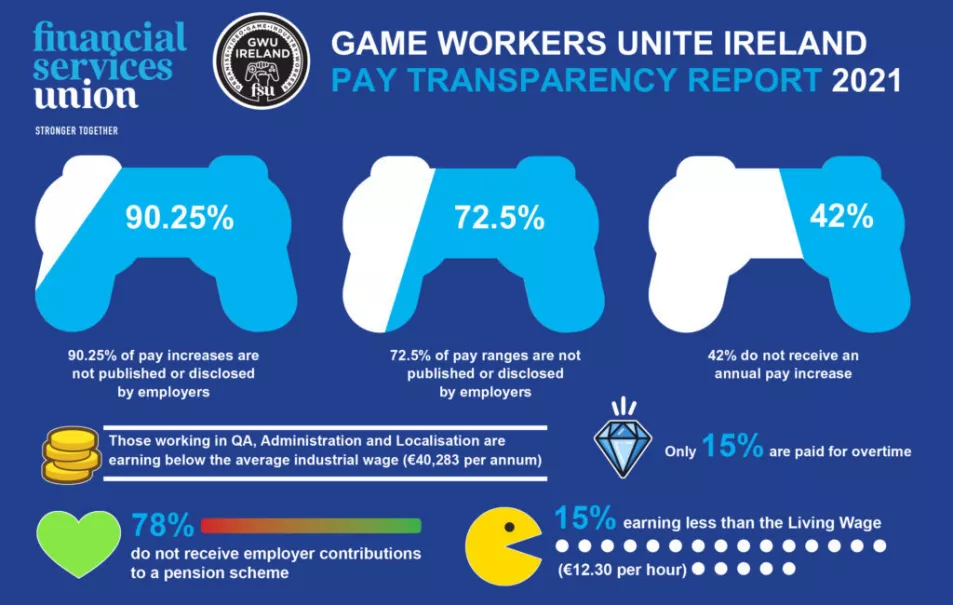The global video games industry is now bigger than both movies and music combined with an estimated annual revenue this year of over $200 billion (€188 billion).
The pandemic saw massive growth in gaming as people were largely confined to their homes and had more free time.
Despite record profits across the industry, and the perception that it is staffed by highly-paid IT developers, over the past number of years there has been an increased focus on how games are made and the rights of those who make them.
Long hours, low pay and toxic work environments have been some of the key issues that have come to light over the past decade. It has led to a greater call for unions within the industry.
While these industry-wide issues affect the Irish gaming sector as well, as Gareth Murphy a representative from the Game Workers United Ireland (part of the Financial services union) says there are also issues unique to Ireland.
“There are questions around working conditions and the nature of work here in Ireland that is spurring on unionisation."
He says there is a surprisingly large number of low paid workers in the games sector here than elsewhere.
According to a Game Workers United Ireland survey in 2020, 64 per cent of respondents said they had experienced low pay in the industry, 17 per cent said they had experienced missed payments while 45 per cent said they were unpaid for overtime.
Other issues include the type of contracts workers were given and also the issues of 'crunch', which refers to periods during development where workers put in extended overtime and often work 60-80 hours a week.

These long hours usually happen as a game is nearing its release date and there is pressure to work late for a number of months.
In terms of contracts, 62 per cent of those surveyed said they do not have secure contracts, while 55 per cent said they had experienced culture of crunch.
One of the more worrying elements regarding pay is that when they conducted the survey, one of the reasons the participation was lower is that a lot of workers are made sign non-disclosure agreements (NDAs) on pay as part of their contracts.
"It means workers are really scared of talking about pay. Lack of pay transparency is a major issue as well," said Murphy.
Digital Game Tax Credit
It paints a bleak picture of the industry in Ireland, but Mr Murphy is positive things can be improved.
"I think there is huge potential to grow here in Ireland, but it has not quite lived up to it yet. Developers have been saying that for over a decade."
He said the current Government is trying to change things and is helping the sector to grow.
He points to the Digital Game Tax Credit, which aims to attract investment in the sector here. It is similar to how the Irish film industry and has attracted production companies to Ireland.
“We were in favour of the credit, but we said let’s link it to things like paying a living wage and the right to join a trade union,” said Murphy.
“They committed to us in writing that they would link it to a statement of quality employment, but we are still waiting to see what exactly is in that," he said.
The living wage is another major issue within the industry. Murphy calls it "scandalous" for such a profitable industry that there are many workers being paid just below the recommended €12.90 an hour.
When starting up the union he said one of the things they focused on is trying to get at least the living wage across the industry.
In terms of companies that are backing Game Workers United Ireland include the likes of Black Shamrock, Keywords, Digit, Romero Games, Mogi and Activision/Blizzard.

They also represent other smaller independent studios as well.
Mr Murphy describes a two-tier system where a lot of work in areas like Quality Assurance (QA) and localisation are on low wages.
He said: "Those who work in admin and QA are not seen as 'real' workers," compared to game developers."
The union runs helplines if people have issues with their employer, and he says one of the biggest trends is work pressure.
"The legal right to overtime is another complaint and people often have to ask for time in lieu. "
The knock-on effect of all these issues is that many people are leaving the gaming industry in Ireland.
"Unfortunately, we are losing a lot of talent who are moving to other industries.
"Staff retention is a big issue because of the work environment and low pay. Those messages go back to offices in the US or Japan, so they are less likely to invest here. "







